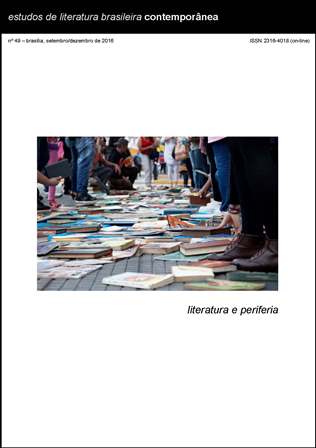A periferia em Conceição Evaristo e Esmeralda Ribeiro:
questões de gênero, raça e classe
DOI:
https://doi.org/10.1590/2316-4018493Abstract
O presente trabalho situa-se no contexto da produção contística de autoria feminina afro-brasileira na série literária Cadernos negros (1978”“atual). O estudo tem por objetivo a análise crítica de alguns dos contos mais representativos das escritoras Conceição Evaristo e Esmeralda Ribeiro, de modo a discutir o retrato social da periferia construído pelas narrativas. Por serem construídos a partir de uma perspectiva feminina afro-brasileira, os contos compõem um mosaico de nossa sociedade, que revela a situação de exclusão vivenciada por uma parcela significativa de nossa população.
Downloads
References
BARSOSA, Márcio; RIBEIRO, Esmeralda (Org.) (2008). Cadernos negros: três décadas ”“ Ensaios, poemas, contos. São Paulo: Secretaria Especial de Políticas de Promoção da Igualdade Racial.
BARBOSA, Maria José Somelarte (2011). Esmeralda Ribeiro. In: DUARTE, Eduardo de Assis; FONSECA, Maria Nazareth Soares (Org.). Literatura e afrodescendência no Brasil: antologia crítica. Belo Horizonte: UFMG, v. 3.
DUARTE, Eduardo de Assis; FONSECA, Maria Nazareth Soares (Org.) (2011). Literatura e afrodescendência no Brasil: antologia crítica. Belo Horizonte: UFMG.
EVARISTO, Conceição (1998). Ana Davenga. In: QUILOMBHOJE (Org.). Cadernos negros: os melhores contos. São Paulo: Quilombhoje, p. 31-41.
EVARISTO, Conceição (2003). Ponciá Vicêncio. Belo Horizonte: Mazza.
EVARISTO, Conceição (2005). Olhos d”Ÿágua. In: BARSOSA, Márcio; RIBEIRO, Esmeralda (Org.). Cadernos negros: contos afro-brasileiros. São Paulo: Quilombhoje, v. 28, p. 29-33.
EVARISTO, Conceição (2006). Becos da memória. Belo Horizonte: Mazza.
EVARISTO, Conceição (2007). Zaita esqueceu de guardar os brinquedos. In: BARSOSA, Márcio; RIBEIRO, Esmeralda (Org.). Cadernos negros: contos afrobrasileiros. São Paulo: Quilombhoje, v. 30, p. 35-42.
EVARISTO, Conceição (2011). Insubmissas lágrimas de mulheres. Belo Horizonte: Nadayala.
EVARISTO, Conceição (2014). Olhos d’água. Rio de Janeiro: Pallas; Fundação Biblioteca Nacional.
FONSECA, Maria Nazareth Soares (2011). Literatura negra: sentidos e ramificações. In: DUARTE, Eduardo de Assis; FONSECA, Maria Nazareth Soares (Org.). Literatura e afrodescendência no Brasil: antologia crítica. Belo
Horizonte: UFMG, v. 4, p. 245-278.
RIBEIRO, Esmeralda (1988). Malungos e milongas. São Paulo: Edição da Autora.
RIBEIRO, Esmeralda (1998). Guarde segredo. In: QUILOMBHOJE (Org.). Cadernos negros: os melhores contos. São Paulo: Quilombhoje, p. 65-72.
RIBEIRO, Esmeralda (2005). Encruzilhada. In: BARSOSA, Márcio; RIBEIRO, Esmeralda (Org.). Cadernos negros: contos afro-brasileiros. São Paulo: Quilombhoje, v. 28, p. 53-60.
RIBEIRO, Esmeralda (2007). Orukomi: meu nome. Ilustrações de Edmilson Quirino dos Reis. São Paulo: Quilombhoje.
RIBEIRO, Esmeralda (2011). A moça. In: BARSOSA, Márcio; RIBEIRO, Esmeralda (Org.). Cadernos negros: contos afro-brasileiros. São Paulo: Quilombhoje, v. 34, p. 75-80.
Downloads
Published
How to Cite
Issue
Section
License
Authors who publish in this journal agree to the following terms:
a) The authors maintain the copyright and grant the journal the right of first publication, the work being simultaneously licensed under the Creative Commons Attribution License-Non Commercial 4.0 which allows the sharing of the work with acknowledgment of the authorship of the work and publication this journal.
b) Authors are authorized to enter into additional contracts separately, for non-exclusive distribution of the version of the work published in this journal (eg publish in institutional repository or as a book chapter), with authorship recognition and publication in this journal.
c) Authors are allowed and encouraged to publish and distribute their work online (eg in institutional repositories or on their personal page) after the editorial process, as this can generate productive changes, as well as increase the impact and citation of published work (See The Effect of Free Access).
d) The authors of the approved works authorize the magazine to, after publication, transfer its content for reproduction in content crawlers, virtual libraries and the like.
e) The authors assume that the texts submitted to the publication are of their original creation, being fully responsible for their content in the event of possible opposition by third parties.


